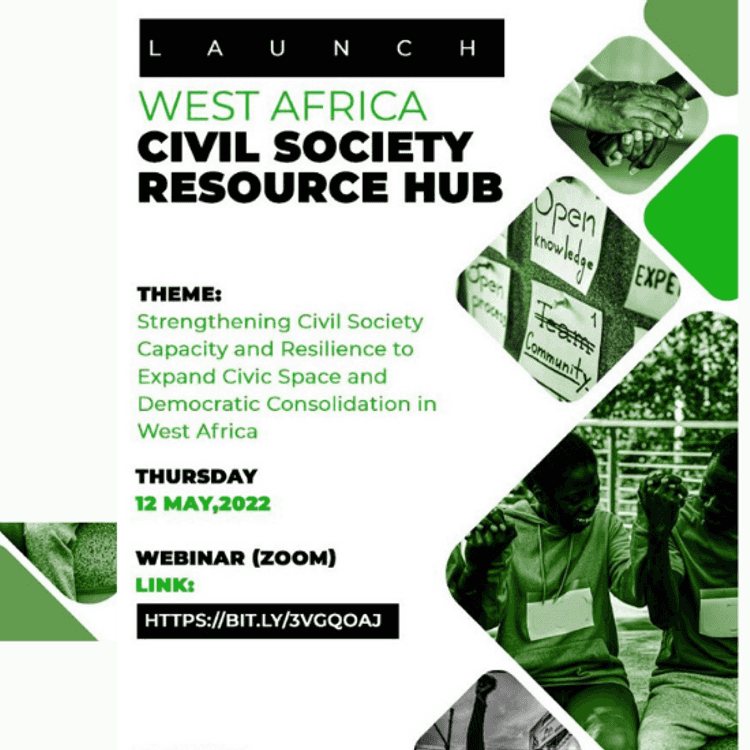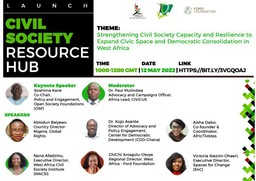Creation of a Resource Center Against the Shrinking Civic Space
CSOs Equipped Against the Weakening Democracy in West Africa
The West Africa Civil Society Institute (WACSI) and its partners, Spaces for Change (Nigeria) and the Ford Foundation, launched on Thursday, May 12, 2022 a five-year project called “Civil Society Resource Center Against Shrinking Civic Space”. This initiative aims to provide a range of technical and institutional support to civil society organisations working to expand civic space in West Africa, particularly in Ghana, Senegal and Nigeria. AfricTivistes was invited to this meeting to discuss the changing environment of civic space and the strategic deficiencies of Senegalese civil society.
“Building civil society capacity and resilience to expand civic space and democratic consolidation in West Africa.” This was the theme of the webinar hosted on Thursday, May 12, 2022 by the West Africa Civil Society Institute (WACSI) and its partners, Spaces for Change (Nigeria) and the Ford Foundation. This was the official launch of the Civil Society Resource Center Against the Shrinking Civic Space (a WACSI/S4C/Ford Foundation initiative). A project that comes in response to the growing restrictions on civic space and the weakening of democracy in West Africa.
In addition to officially unveiling the platform – and communicating its purpose, commitment and expectations to all stakeholders and the public, the webinar provided an opportunity to discuss the rapidly changing civic space amidst emerging democratic reversals and its impact on the operations, growth and sustainability of civil society in West Africa. It also highlighted the strategic capacity gaps (and needs) of civil society to address the restrictions of civic space, including in areas such as regulatory framework, organisational development, resources and digital security.
This regional initiative aims to provide capacity support to civil society organisations facing the declining state of civic space in West Africa. This five-year project will also provide needed capacity to selected CSOs in Ghana, Nigeria, and Senegal, while addressing relevant regional issues related to civic space and the enabling environment.
Ghana and Cape Verde, the only countries ranked free in West Africa
On this occasion, AfricTivistes, represented by its coordinator Aisha Dabo, spoke specifically about the case of Senegal during the panel devoted to the Evolution of the environment of civic space and the strategic deficiencies of civil society.
According to the organisers of the webinar, overall, the increase in attacks on civic space, the growing retreat of democracy and the apparent return of illiberal and unconstitutional power grabs in the region do not bode well for the health of our emerging democracy and sustainable development. According to them, the current situation requires a more coordinated civil society with the capacity to respond to these restrictions, push back against narratives of closed civic space, and advance democratic governance in West Africa.
In several countries in the region, they stress, democratic freedoms are increasingly being trampled, governments are suppressing all dissent and crushing protests, and many people have paid the ultimate price of death for defending rights and freedoms – only exacerbating an already weakened democracy and a new wave of illiberal and unconstitutional power seizures. In the past year alone, military juntas have overtaken democratic governments in West African countries such as Burkina Faso, Guinea and Mali, raising concerns about respect for basic freedoms by non-civilian and undemocratic leaders.
Another concern is that in all of West Africa, only the island state of Cape Verde is rated as open according to CIVICUS Monitor. Referring to Freedom House’s 2020 report on freedom in the world, it was noted that a total of 22 African countries recorded a decline in their score. Among the 12 largest declines globally, five West African nations – Benin, Burkina Faso, Guinea, Mali and Nigeria – are on the list of notable setbacks to democratic governance in the region.
However, it should be noted that over the past two decades, the situation has deteriorated further. For example, in 2020, other countries in the region – Benin, Mali and Senegal – left the list of free countries, leaving only Ghana and Cape Verde; Mali is classified as not free; and the remaining countries are classified as partially free. This trend shows that the ECOWAS countries all seem to be moving toward partially free states (a bit of a gray area).



![[Mali] AfricTivistes calls on the junta to respect fundamental rights!](/static/bd7efaf062b64313cb28d63c1830b96a/9e635/WhatsApp-Image-2024-04-17-at-13.58.19.jpg)


![[Congo]Africtivistes demands the immediate and unconditional release of all activists](/static/503b1823ba8a254ad4ebd649fcf7d38c/fce2a/aliousane.png)

![[Senegal] AfricTivistes and five other organisations demand light be shed on assaullt of journalist Maimouna Ndour Faye](/static/15e44ab239406e91d8f4a5d451f5d71c/9e635/WhatsApp-Image-2024-03-02-at-14.41.24-2.jpg)



![[Senegal] AfricTivistes, two Senegalese journalists petition the ECOWAS Court over repeated mobile Internet data cuts](/static/a46ec338b20b38a189c8e35f96d090a1/fce2a/coupure-dinternet.png.png)
![[Sénégal] AfricTivistes stands against declining democracy in Senegal!](/static/6abab4867f4b682edc9f916ff3bbeb49/9e635/Restriction-internet-.jpg)



